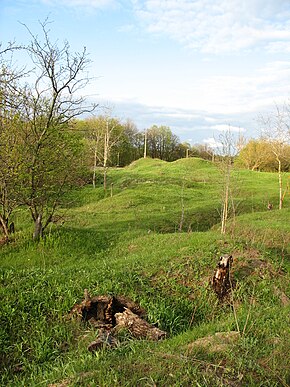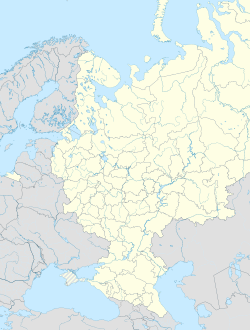Gnezdovo

The Gnezdovo kurgans.
|
|
| Location | Smolensk Oblast, Russia |
|---|---|
| Coordinates | 54°46′N 31°47′E / 54.767°N 31.783°ECoordinates: 54°46′N 31°47′E / 54.767°N 31.783°E |
| Type | Settlement |
| Site notes | |
| Condition | In ruins |
Gnezdovo or Gnyozdovo (Russian: Гнёздово) is an archeological site located near the village of Gnyozdovo in Smolensk Oblast, Russia. The site contains extensive remains of a Slavic-Varangian settlement that flourished in the 10th century as a major trade station on the trade route from the Varangians to the Greeks.
The archaeological site comprises a "citadel" (gorodishche) (Russian: Городище), formerly situated at the confluence of the Rivers Dnieper and Svinets, and a ring of ancient rural settlements (selitba) which occupy an area of 17.5 hectares, of which roughly 5,000 square metres (54,000 sq ft) had been excavated by the end of the 20th century. This makes the site one of the largest survivals of the Viking Age in Europe: only Hedeby covered a larger territory (24 hectares), with the sites of Birka (13 hectares), Dublin (12 hectares), Ribe (10 hectares), and Gdańsk (1 hectare) trailing behind. There are about 3,000 burial mounds arranged in eight clusters of kurgans. Of these, about 1,300 mounds have been explored by Russian and Soviet archaeologists, starting in 1874.
There is some disagreement among scholars as to which ethnic element predominated at Gnyozdovo. Although a Varangian presence is pronounced, nineteen mounds out of twenty contain ordinary burials of Krivichs and Baltic men and women. The burial rite is mostly cremation. The most numerous finds are household utensils and pottery. As a general observation, the Gnyozdovo tumuli have parallels with the "druzhina kurgans" of Chernigov, such as the Black Grave.
...
Wikipedia

